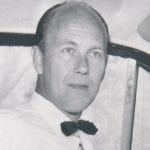 History
History  History
History  Health
Health 10 Everyday Activities That Secretly Alter Consciousness
 History
History Top 10 Historical Disasters Caused by Someone Calling in Sick
 Animals
Animals 10 New Shark Secrets That Recently Dropped
 Movies and TV
Movies and TV 10 Forgotten Realities of Early Live Television Broadcasts
 Technology
Technology 10 Stopgap Technologies That Became Industry Standards
 Weird Stuff
Weird Stuff 10 Wild Facts About Taxidermy That You Probably Didn’t Know
 Travel
Travel 10 Beautiful Travel Destinations (That Will Kill You)
 Miscellaneous
Miscellaneous 10 Modern Marriage Rituals Born from Corporate Branding
 Weird Stuff
Weird Stuff Ten Bizarre Visions of 2026 from Fiction
 History
History 10 “Modern” Problems with Surprising Historical Analogs
 Health
Health 10 Everyday Activities That Secretly Alter Consciousness
 History
History Top 10 Historical Disasters Caused by Someone Calling in Sick
Who's Behind Listverse?

Jamie Frater
Head Editor
Jamie founded Listverse due to an insatiable desire to share fascinating, obscure, and bizarre facts. He has been a guest speaker on numerous national radio and television stations and is a five time published author.
More About Us Animals
Animals 10 New Shark Secrets That Recently Dropped
 Movies and TV
Movies and TV 10 Forgotten Realities of Early Live Television Broadcasts
 Technology
Technology 10 Stopgap Technologies That Became Industry Standards
 Weird Stuff
Weird Stuff 10 Wild Facts About Taxidermy That You Probably Didn’t Know
 Travel
Travel 10 Beautiful Travel Destinations (That Will Kill You)
 Miscellaneous
Miscellaneous 10 Modern Marriage Rituals Born from Corporate Branding
 Weird Stuff
Weird Stuff Ten Bizarre Visions of 2026 from Fiction
10 Tiny Things That Nearly Changed History
It only takes the tiniest thing to change the world. A butterfly beating its wings in Texas may not start a hurricane in China, but a wrong turn can trigger one of the deadliest wars in human history. Time and again, seemingly insignificant things have proven adept at altering the course of history. But then there are the ones that almost did so, the tiny moments where history hung in the balance, only to swing the other way. In an alternate universe somewhere, these 10 little things created the modern world.
10 A Single Paragraph Almost Prevented The Civil War
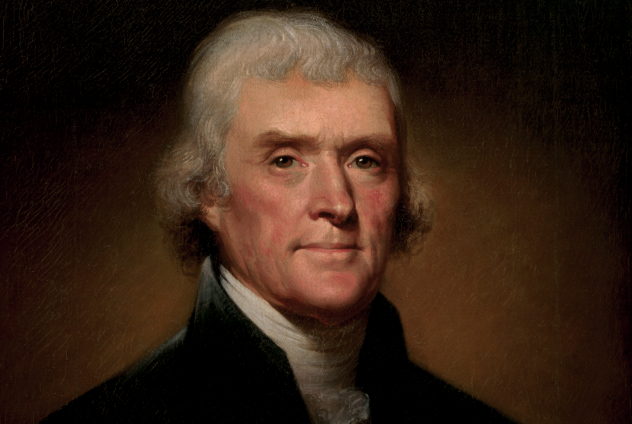
Although some contend that the Civil War was fought over states’ rights, those rights were inextricably linked to slavery. Texas’s declaration of secession, for example, mentions slavery 18 times. But what if there was no slavery in the first place? If Thomas Jefferson had had his way, that might well have been the case.
This theory hinges on earlier drafts of the Declaration of Independence. Ratified on July 4, 1776, the version we all know is basically one long dis of King George III, trash talking his fitness to rule. It also contains some epically moving passages on human rights, including the equality of all men. These passages were watered down for the final version. In his earlier drafts, Jefferson included a multi-sentence rant against the evils of slavery.
The rant took place on the third page, and reads as follows:
He [King George III] has waged cruel war against [word missing] itself, violating it’s most sacr[ed] [ . . . ] of life and liberty in the persons of a distant people, who never offended him, captivating and carrying them into slavery in another hemisphere, or to incur miserable death in their transportation thither. This piratical warfare, the opprobrium of infidel powers, is the warfare of the Christian king of Great Britain, determined to keep open a market where MEN should be bought and sold, he has prostituted his negative for suppressing every legislative attempt to prohibit or to restrain this execrable commerce.
In short, the passage makes the horrors of British slavery an integral part to the US’s decision to go it solo. Had it made the final version, it could easily have become a rallying cry. If that had been the case, accepting a slave-owning South in the years after the Revolutionary War would have become one heck of a lot harder. With no institution of slavery to fight over, it’s probable that the Civil War would never have happened.
9 A Picture Of A Fish Nearly Held Back Science For Decades

First published in July 1687, Isaac Newton’s Principia is one of the most important books ever written. It effectively invented physics, changing the way we see the world and laying the groundwork for centuries of scientific inquiry. Yet it was nearly never published, thanks to a picture of a flying fish.
In 1686, Britain’s Royal Society was preparing to publish the first editions of Principia. Before they could get started, however, they needed to release another blockbuster book. John Ray and Francis Willughby’s Historia Piscium was an epic work on the history of fish, featuring extremely detailed engravings. One of the most complex of all was a picture of a flying fish, which alone cost piles of money to reproduce. These costs made the book one of the most expensive ever made. The society released it, and it flopped.
It flopped so hard it nearly bankrupted the society. Suddenly lacking any money whatsoever, the publishers canceled their plans to publish Principia. One of the most important books ever written only saw the light of day because a friend of Newton’s eventually agreed to provide the cash.
8 A Funding Agreement Almost Saw Britain Win The Space Race
The space race was a bruising scientific showdown that saw both global superpowers take a gold. Russia managed to put the first man in orbit, while the US took the Moon. Yet both were nearly beaten by an unexpected rival. Had a small government department signed off on a check, it’s likely that the first man in space would have been from Great Britain.
In the aftermath of World War II, all of the world’s great powers were scrambling to master rocket technology. The US managed to snatch Hitler’s rocket man, Wernher von Braun, away from Europe, while the Russians nabbed his old research facilities. Britain had to make do with some old Nazi V-2s that the army had managed to salvage. On this alone, they began to build a viable space program.
Immediately after the war, the UK was testing old V-2s by blasting them nearly into orbit and then guiding them down to land. (The rockets couldn’t quite reach full orbit.) Ralph Smith of the British Interplanetary Society put forward a design for turning these rockets into habitable machines. He calculated that a single man could be placed in a windowed capsule, blasted into space for up to five minutes, and then returned to Earth safely. The designs were practical and used existing technology. It was estimated that British men could be routinely blasting into space by 1951.
At least, they would have been, had the Ministry of Supply not refused to sign the check. In December 1946, Britain was broke, and the new Labour government was more interested in creating the welfare state than putting men into space. Funding was turned down after careful consideration in early 1947, and the fledgling UK space program was abandoned.
7 A Snowstorm Could Have Killed Napoleon In 1807
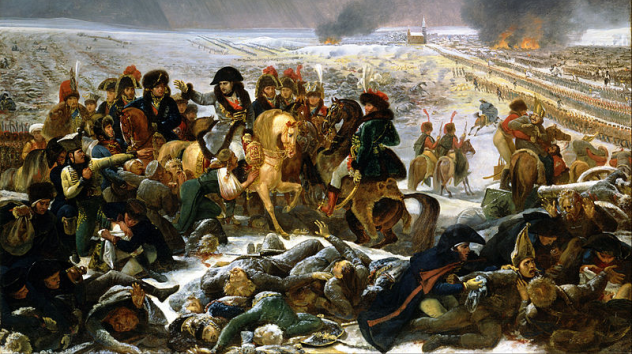
The Battle of Eylau in February 1807 is today chiefly remembered for seeing Napoleon screw up for the first time as a commander. Fought in East Prussia (modern Russia), it led to a deadlock between the two powers that almost lost Napoleon half his army. He also very nearly lost something much more important, namely his life, to a snowstorm.
On the morning of February 8, Napoleon was playing for time, waiting for reinforcements to arrive. The French troops were taking a beating, and the Russians were advancing. From the top of a bell tower in the town, the emperor tried to get a handle on the situation below. Suddenly, a tremendous snowstorm blew in. In the resulting whiteout, all vision was lost. So blinded were the French by the weather, they didn’t notice as 6,000 Russians descended upon the town.
Up in his bell tower, Napoleon was practically unguarded. The Russian surprise attack very nearly overwhelmed his position, which would have likely cost him his life. It was only by a combination of luck and insane bravery that his personal guard managed to hold the advancing army at bay just long enough for the reinforcements to finally arrive. The Napoleonic Wars would continue for another eight years.
6 A Heart Attack Nearly Changed British (And Iraqi) History
On May 12, 1994, British Labour Party leader John Smith suffered a fatal heart attack. His death opened the leadership to a young man known as Tony Blair, who would go on to win three elections in a row. It was a pivotal moment in British history, and it nearly didn’t happen thanks to another heart attack.
Back in 1988, Smith had been an up-and-coming member of the Labour party when he suffered his first heart attack. Writing about it decades later, Tony Blair said that this first incident had been brought on by Smith’s excessive drinking. Smith was known to enjoy several pints a day and to lead a massively unhealthy lifestyle on top of that. This first heart attack could have served as a warning. It could have encouraged him to stop drinking or to exercise more. It almost certainly should have. Instead, Smith went right back to the bottle. It was a decision that almost certainly contributed to his second, fatal heart attack six years later.
Had Smith lived, history would be very different. While the Labour Party would have probably still won the 1997 and 2001 elections (albeit with a lower vote share), the largely anti-interventionist Smith definitely would not have joined the US in invading Iraq. As America’s only partner in 2003, it’s conceivable that lack of UK support could have stopped the Iraq War from happening at all. In that case, global politics would now look very different.
5 A Copyright Claim Could Have Balkanized The Internet

Imagine living in a world where “the” Internet had been replaced by multiple Internets, where competing browsers were completely incompatible, information was kept on strict, closed loops, and getting online meant choosing which company’s vision of the web you wanted to buy into. There’d be no vast, shared experience like Twitter, no popular list-based websites, and no Internet as we know it. In 1992, this world nearly happened.
In an interview with Time magazine in 2001, Tim Berners-Lee revealed that he seriously considered patenting the web not long after its launch. He and a friend consulted with lawyers about going the money route and setting up their own company, something which potentially could have made them both millions. Ultimately, Berners-Lee rejected the idea, preferring to focus on the tech side of things and keep the web open to all. That decision could have easily gone the other way.
Had that happened, you wouldn’t be reading this now. In 2011, TechDirt compiled a list of potential differences if the web had been patented, and the results were insane. You’d have no Google. Search would be abysmal. Everyone would be restricted to tiny, walled gardens, only able to communicate and interact with those subscribed to the same company. Smartphones would have probably never come about. Our whole world would be less connected and more technologically backward.
4 A School Bus Almost Helped Timothy McVeigh Escape Justice

On April 19, 1995, a truck packed with a powerful fertilizer bomb exploded outside the Alfred P. Murrah Federal Building in Oklahoma City. The blast killed 168 people, including 18 children. At the time, it was the worst terror attack committed on US soil. By sheer dumb luck, the bomber, Timothy McVeigh, was pulled over 90 minutes later for driving without a license and arrested for carrying a concealed weapon. But luck nearly swung back in McVeigh’s favor. Two days later, he came within minutes of being set free.
At the time, no one thought this that disheveled loner could be connected to the blast. The CIA thought Saddam was responsible, and the FBI was gunning for Islamic terrorists. McVeigh was just a guy being held on a concealed carry charge and was due to make bail any minute. The day after he was arrested, he was to go before a judge, but the hearing was delayed due to an ongoing divorce case. The very next day, he was brought in again. He would have certainly gone free had it not been for an unknown bus driver.
That morning, the judge’s son had just missed his school bus. Instead of going to McVeigh’s hearing, the judge had to drive his son to school. This delay meant that McVeigh was still in the courthouse when the FBI called up, urgently asking the police to detain him. If that bus had been running slightly behind schedule, or if the judge’s son had gotten ready faster, the bomber would have made bail and vanished into the morning heat. How long it would have taken to recapture him, or if he would have killed again, is anyone’s guess.
3 A Change Of Weather Could Have Altered European History
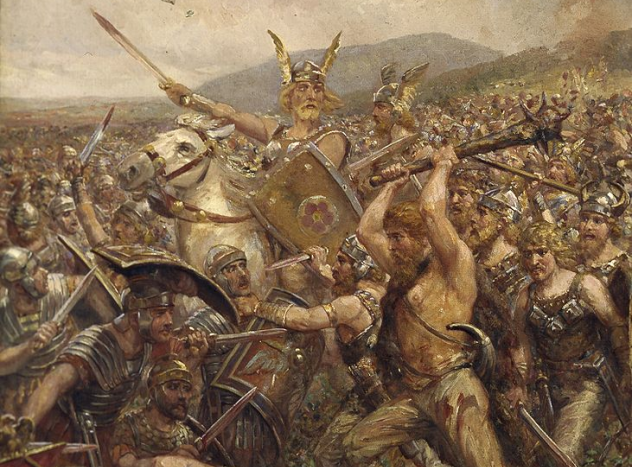
The Battle of the Teutoburg Forest in AD 9 is a military engagement that almost nobody has heard of. Fought between three Roman legions and local Germanic tribes, it ended in a blistering defeat for the Romans. But it could easily have gone the other way. If it had, the entire course of European history would have changed dramatically.
The ambush was a major psychological setback for the Romans. Around 12,000 legionnaires were slaughtered in the most gruesome way possible, their heads nailed to trees as a warning to the empire. As a direct result, Emperor Augustus halted Rome’s expansion. A border was set up along the Germanic frontier that lasted 400 years. Subsequent emperors were warned against trying their luck there.
For the descendants of the Germanic tribes, the battle was just as important. It became known as the “big bang” that started the German nation. This myth would eventually become an important part of German nationalism. It would even be used by Adolf Hitler to inspire hatred against the Jews.
However, victory for the tribes was not a foregone conclusion that day. In his phenomenal essay “What If?” Lewis H. Lapham argued that any number of things from tiredness to slightly drier weather could have thrown the battle to the Romans. In that case, world history would have changed completely. Germany would have come under Roman rule, Germanic languages (including English) would be replaced by Romance ones, and the Reformation would likely never have happened, nor would the Thirty Years War or World War I. The modern world wouldn’t just be different; it’d be completely unrecognizable.
2 A Piece Of Advice Could Have Killed One Million People

In politics, what you don’t say can frequently have even more impact than what you do. For US Secretary of Defense William Perry, this point was forcibly rammed home in the summer of 1994. At the time, tensions on the Korean Peninsula were about to boil over. North Korea was rushing to get a nuclear bomb at its Yongbyon facility. South Korea wanted to stop them. As the guarantor of South Korean integrity, the US was duty-bound to get involved.
On June 16, Perry and Joint Chiefs Chairman John Shalikashvili were called in to brief President Clinton. Clinton wanted to discuss the possibility of bombing Yongbyon. The main sticking point was the potential nuclear contamination that could result. Perry himself was certain that the US could take out Yongbyon without washing the peninsula in radiation. However, he was equally certain telling the president that this would result in the bombing being green-lit. This would in turn ignite a catastrophic war. At the last minute, Perry chose to keep silent. The bombing was delayed.
It turned out to be the right decision. Two days later, Jimmy Carter flew to Pyongyang as a private citizen and brokered a peace deal. The crisis ended without a shot fired. The Pentagon later released its scenarios for what would have happened if war had come that fateful day. They predicted a minimum of one million dead Koreans, the total destruction of Pyongyang and Seoul, and the deaths of at least 50,000 American servicemen.
1 One Man’s Death Nearly Reignited World War II
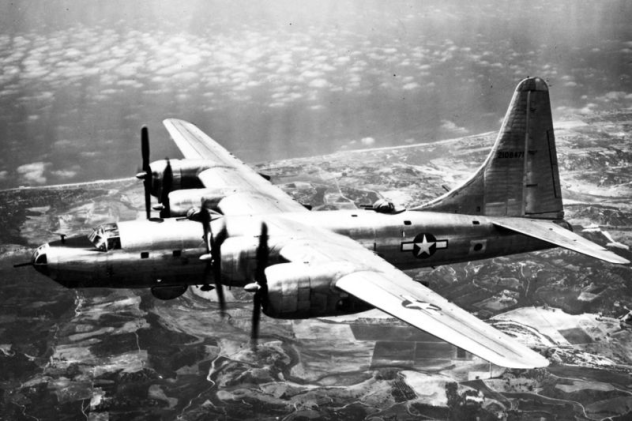
Anthony Marchione has a dubious distinction. While flying over Japan, he became the last American serviceman to be killed during World War II. His legacy could have been far, far worse. Marchione’s death very nearly reignited World War II.
At the time, Japan had already surrendered. The bombing of Nagasaki and Hiroshima had brought Hirohito to the table, and the emperor had already survived a palace coup attempt by his warmongering generals. Standard history tells us that the war in Asia was over, but not all of Japan got the message. South of Tokyo, the 302nd and Yokosuka air groups vowed to fight on. If any Allied aircraft tried to fly over Tokyo, they would shoot them down. Care to guess what happened next?
On August 16, General Douglas MacArthur decided to test the Japanese commitment to the surrender by sending four bombers over Tokyo. Although the group flew out and returned unscathed, MacArthur sent them out again. On August 17, the planes flew over the 302nd and Yokosuka groups, who took potshots at them. Worried that his peace was now unraveling, MacArthur sent the planes out one last time. If the Japanese attacked, he decided it would show that the ceasefire had already broken down. They did.
The rebel Japanese groups overwhelmed the Allied bombers. In the ensuing firefight, Staff Sergeant Joseph Lacharite was severely wounded, and Anthony Marchione was killed. MacArthur now seemingly had evidence that the Japanese were preparing to fight on. Logically, he should restart aerial bombing immediately. Such an act would have certainly reignited the war.
Luckily, a peace delegation was scheduled to meet MacArthur the next day. The general decided that if they showed up, the Tokyo attack must be due to disloyal rebels. If they didn’t, the war was back on. The delegation showed up. Had MacArthur restarted the war after Marchione’s death, it would have led to a protracted battle in the Pacific. Millions more would have died. A third atomic bomb would probably have been dropped. World War II would have dragged on for months or years to come.








